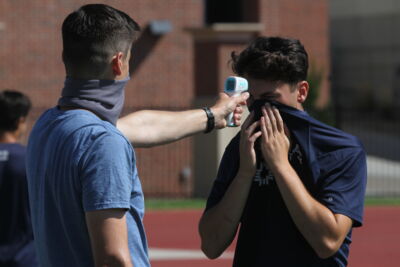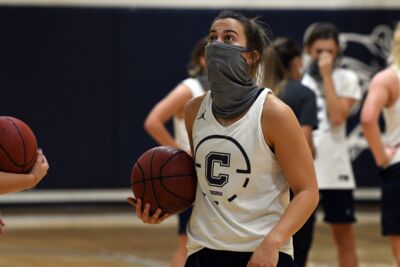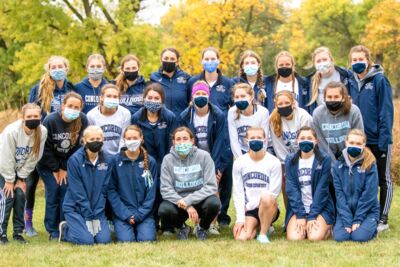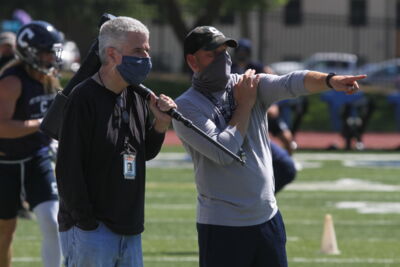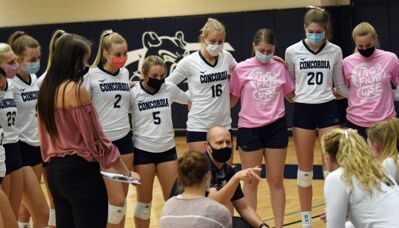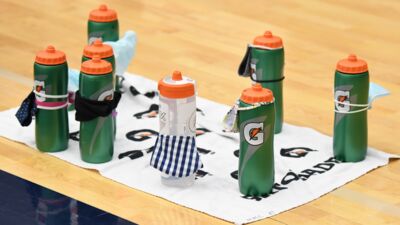
NOTE: A version of this story first appeared in the winter edition of Concordia's Broadcaster magazine.
On four separate home football dates this past fall, Athletic Trainer Eric Lundberg and a small staff of student trainers prepared to run more than 100 student-athletes through COVID-19 screenings. The screenings involve temperature checks and a comprehensive quiz regarding various symptoms associated with a virus that has infiltrated nearly all aspects of life. From the perspective of athletic training, Lundberg has been tasked with staying up-to-date on the latest and greatest practices for managing the pandemic.
Once the green light was given by national and local health authorities, Concordia put together plans for playing through the pandemic. Nothing was going to be perfect and, as Lundberg says, it was inevitable that Concordia student-athletes (and general students) would eventually test positive for the virus.
“We thought the safest way was to take the most conservative approach,” Lundberg said. “There have been a couple of cases where I’d say if we had not followed the return-to-play protocol, we could have seen some issues pop up. Obviously the data is rapidly evolving, but we wanted to make sure we could prevent our athletes from experiencing adverse medical conditions. We’ve made sure to do this the smart way as opposed to the more convenient way. It has caused some frustration among athletes, but I think they appreciate the care we’re giving them to get them on the field as safely as possible.”
There has never been a more unique or more awkward time for athletics at Concordia University, Nebraska. There are enough protocols, policies, procedures, directional arrows and health measures to make one’s head spin in circles. Every day is unrelenting in regards to the need for face coverings, sanitization, hand washing, distancing and temperature screenings. Any trace of the COVID-19 virus within a team’s roster wreaks havoc on scheduling. As one national sportswriter put it, scheduling of college athletics in 2020-21 is “wilder than a goat rodeo.”
When it comes to athletics in the COVID-19 era, this really is everyone’s very first rodeo. It’s within this context that Director of Athletics Devin Smith and Associate AD Angela Muller have tirelessly worked to preserve the student-athlete experience. The first athletic event of the academic year took place on Sept. 5 with Concordia, the GPAC and many NAIA member institutions just beginning to navigate unpredictable twists and turns.
Though the unique challenges caused widespread postponements and even cancellations of seasons across all levels of collegiate athletics, Concordia administration, coaches and student-athletes have committed themselves to keep playing and competing while fighting to save seasons. Of course, the safety of everyone involved had to be ensured. That’s where strict adherence to protocols comes into play.
“It’s been an educational journey,” said Devin Smith at a time when the fall sports season had just gotten underway. “The messaging is ongoing. I think our student-athletes and staff members have done an incredible job really trying to do the best they can to stay up with the ever-evolving changes. Sometimes it’s like raising kids at home – you have to remind them a lot, but I’m proud of them. The best way I can sum it up is it’s a constant educational journey.”
Some scheduling hiccups resulted in the GPAC tournaments for volleyball and men’s and women’s soccer being postponed until the spring semester. On the plus side, all Bulldog fall teams either completed or very nearly completed their full conference regular-season slates by Nov. 21. Now the coaching staffs for those respective sports are figuring out how to effectively ramp back up for 2020 fall sport postseason tournaments to be held in the spring of 2021.
Head Football Coach Patrick Daberkow’s Bulldogs finished the 2020 season with a 4-4 record. During the uncertainty of the summer months leading up to football season, Daberkow was adamant that the mental health of student-athletes should be factored into decisions about whether to play or not. In other words, it could be argued that a certain level of mental health is sacrificed when college athletes are prevented from competing in sports that provide lessons, friendships, structure and direction.
“They came to college to play football for a reason,” Daberkow said prior to the start of the season. “Football teaches a lot of life lessons. I learned a lot from being on the team, being part of the locker room and being out on the field. They recognize that as well. They want to be together and reach these goals that we have had. I am a big believer in getting back to it and after it. It is what I think is best not just for our football players but for people everywhere.”
Under the direction of Head Coach Ben Boldt, the volleyball program appears poised for another berth in the national tournament. Ben and assistant coach Angie Boldt (Ben’s wife) have shown an ability to rally their team together around a unifying theme. For 2020-21, the Bulldogs have focused on being “connected” and “resilient,” two words that seem fitting for dealing with the COVID-19 era.
After a breakthrough national tournament run in 2019, Concordia Volleyball was determined to continue its momentum. There’s an incentive to following protocols, like wearing masks while traveling to away matches. These Bulldogs want to keep playing.
Said Kara Stark, a volleyball senior, “It’s really easy to dwell on how different this year is, how inconvenient and frustrating all these protocols and changes can be, but that’s not helpful for anyone. We get to play volleyball. There are so many schools across the nation that don’t get to play right now, and we’ve been blessed with the opportunity to be in the gym every week.”
As fellow residents of the newly renamed Friedrich Arena, the Concordia Basketball teams are well underway this winter. The regular seasons for basketball were cut to 25 games. As another unfortunate consequence of COVID-19, the annual Concordia Invitational Tournament had to be canceled for the first time since the 1975-76 season.
Despite the disappointment of a year without CIT, Head Coach Drew Olson and his program were thankful to return to the court. It sure beats what the 2019-20 team experienced when the No. 1 ranked Bulldogs had their season abruptly ended after winning in the first round of the national tournament. That squad did not have the opportunity to defend its national title.
“The summer was tough not being able to be around each other,” Olson said. “You just miss them. I love watching them play and being around them. Now that we’re in school and we get to practice, one of our phrases is – entitled to nothing and grateful for everything. We’re really grateful to be able to play and be around each other every day, even if it is with masks and it’s a little bit different. It brings us together and it’s still basketball.”
As COVID-19 cases have risen in Seward County, the state of Nebraska and elsewhere, Smith has continued to harp on the fundamentals of slowing the spread. Some nearby athletic departments have decided to cease allowing fans at their indoor venues while Concordia strictly adheres to COVID-19 Directed Health Measures. New DHMs that recently went into effect have capped Friedrich Arena at 50 percent capacity.
At a moment’s notice, some athletic teams within the GPAC have shut their teams down for two-week time periods. Any games scheduled during those shutdowns are forced to be postponed (or even canceled). A junior guard on the men’s basketball team, Carter Kent knows how delicate things can be in this era. Several members of the team had to be quarantined early in the fall semester.
Said Kent, “It’s definitely a realization at some point where if we don’t follow these protocols we’re probably not going to have much of a season. For us to have a season, we have to follow the protocols. We want to keep everyone safe, including ourselves and everyone around us.”
Senior Garrett Perry of the men’s soccer team is no fan of wearing a mask, but he has followed protocols for a chance at achieving his goals. The Bulldogs went 7-2-2 in conference play this past fall while showing they could again compete with the top teams in the GPAC.
“No one wants to wear masks,” Perry said during the preseason. “They’re not fun, but we all love soccer. The thing is if we even want a chance to play and hold the plaque for winning the GPAC, we have to start with the masks and following the health protocols. The second we stop doing that our season’s going to end.”
Perry and Stark never would have envisioned senior seasons that look quite like this – no one could have. The circumstances are so unusual that the NAIA actually made a ruling in early November that all of the association’s fall and winter sport athletes would not be charged with a season of competition in 2020-21. This may be a freebie year of sorts, but not all student-athletes can put their future plans on hold and return for the fall of 2021 (or 2022, etc.).
Thus, Bulldog athletes are thankful for the opportunity they have been given this 2020-21 academic year, even in a time when things are so completely out of whack. It’s been a time for cherishing the moment – and staying in the moment.
Said senior volleyball student-athlete Marissa Hoerman, “Being appreciative is so important right now, and I think it's pretty hard not to be. We see what other schools and athletes are going through every day, even in our own conference, and it's really motivating for us to follow protocols and try to do the right stuff. Even then, you never know when it's going to hit us. Without being cynical all the time, we remind each other that we're lucky to be here.”
It has to be more than just luck that carried Concordia Athletics through the fall semester with a mostly successful few months. No, it hasn’t all been perfect. The “educational journey” is not yet over as the virus continues to rage in our nation and in our communities. It’s going to take commitment to the protocols – and faith in the Lord – to see this thing out.
Bulldog athletes want to keep competing, and as long as it’s safe to do so, Concordia University, Nebraska will keep providing those opportunities.
“We’re blessed to be able to keep playing,” said senior defensive end Chase Hammons late in the football season. “This is something you wouldn’t imagine would ever happen. You think about how hard you’ve worked the last three years to get to this point and then something unforeseen happens. I feel for those people who may not get a season. We’re so lucky to be able to do what we have been.”
Added Lundberg, “I think it’s really cool that we have stepped out as leaders in the collegiate athletic world as an institution that has been able to compete in a safe manner. We’ve taken the steps to mitigate the risk and show that we can do this thing in a safe way.”
